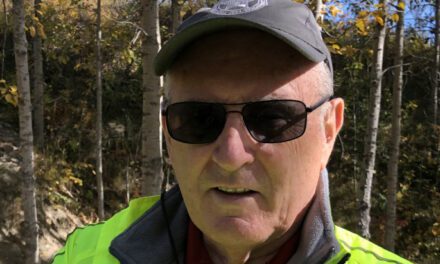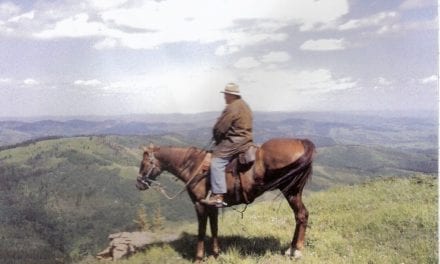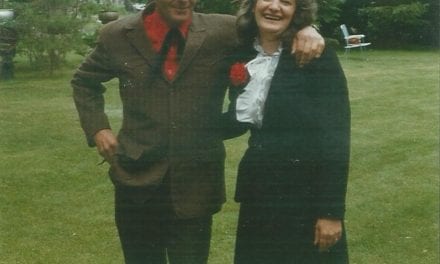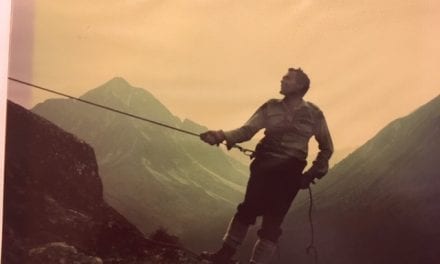MH: How did the arrest go? Can you describe what happened? 2112
MC: We were always trained to be super polite, even when you’re arresting somebody. You kind of hate to arrest someone but sometimes you have to do it. I was very polite and he was already out of his vehicle, on a little hill with his binoculars. So he was isolated from his vehicle when I made the arrest. And pretty basic, I just got him to confirm his identity and told him he had a warrant out for his arrest and asked him to please put his hands behind him and don’t move, read him his rights, and put him in handcuffs. It was all very polite and civil. If I had been an RCMP and I’d been real heavy, he might have tried to use one of those loaded 45s that were on the front seat beside him. At the time, I had kind of a gut feeling that there was something more to this, spidey senses up and down my back, but the arrest went off like textbook. I think I was pretty lucky there. We never did figure out why this person had all these weapons and all the ammunition. But at the time, it was before RCMP had been issued carbines. He could have wiped out the whole town with what he had there for arms. The fellow had done three tours of duty in Afghanistan and he had some real mental problems.
We had some big MVA’s in Saskatchewan Crossing, people drowning, falling. And some of the things that really stick out in my mind was this one young fellow that fell off of a waterfall at Rampart Creek. He was staying in the hostel there, and AL and I, it was probably half an hour after the event by the time we got there, but we did CPR until the helicopter got there. And he ultimately didn’t make it. He was about 19 or 20. But what really sticks out in my mind is his parents. They wanted to talk to AL and I. A few days after and they drove all the way to Saskatchewan Crossing, I think they were from Calgary. At the time I had my daughter Becky who was about one and a half or so and I didn’t want to have any more kids, but after talking to these parents about how devastated they were, after losing their son, I changed my mind and I agreed with Winifred to have another. I thought if anything like that ever happened I wanted another. It was just so devastating to the parents. Would have been nice and still would be nice to do CPR sometime when it actually worked to save the person.
MH: Anymore rescue/wildlife stories that stick out in your memory? 2635
MC: I don’t have any more written down but trying to separate photographers during the elk rut in Jasper was always pretty interesting. During the calving period for elk in Jasper was pretty hairy. Two or three maybe four wardens would grab a calf and physically carry it out of the campground with an irate cow trying to kill them. We did that over and over every spring in Jasper and why somebody was never really seriously injured doing that I don’t know. A few people got marked up a bit, especially Barny (Lawrence Baraniuk) but that was pretty full on. When I was in the backcountry in Scotch Camp, I had a grizzly false charge me three or four times and that was pretty exciting. You read books about these bear encounters and quite often, the guy says, “Somehow I knew it wasn’t going to end badly” and I could tell the same from this bear. It was a sow with a cub. At Scotch Camp, the barn is quite a way from the cabin. So I stopped at the cabin and unloaded my pack boxes and saddle bags and rifle. Then I was leading the horses down to the barn area, just with their saddles on and about maybe 20-30 feet from the gate of the corral, I stopped short because there was this grizzly and her cub inside the corral, rummaging for oats and whatnot. I had two horses by their halters and they started doing a dance around me and the sow gave a little woof and her cub went up a tree. And then she charged me three or four times and each time she would get a little bit closer and then she would turn around and go back and look over shoulder and I finally got the horses sorted out and took them back up the hill and unsaddled them up at the cabin and turned them loose up there. That was a pretty neat bear encounter.
And the Tonquin, where I was for three years, it probably has the highest density of grizzly bears in Jasper, a lot of bears in there because of the good habitat. And back when I was in there, you were allowed to take your family with you, so I had my two girls and Winifred with me for most of the summers, and we ran into bears several times. Once I had to go and do an inspection of the Wates/Gibson (Alpine Club of Canada) hut, so my family tagged along for a ways and then they stopped and had a picnic at a little lake, and I went on and did the inspection. On the way back, it was starting to get a little later in the day, I met up with the family, and coming through the campground at Surprise Point, there was a bunch of campers and another sow with a single cub that had been fairly close to the campground and this one camper thought he was going to scare the bears off with a bear banger. He fired his bear banger at these two bears and it went right over top of them and sent the bears right towards all the people. And so when we got there, all these seven or eight people were all huddled on the bridge across the river, freaked out. Back then my daughter Merewyn was probably about five or six and Becky was about 10 or 11, and everybody had their own bear spray. We could see the sow and cub and they were between us and the warden cabin. And it’s starting to get dark. If you’ve ever been to this area, you can’t really bushwack through that buck brush, you pretty much have to stick to the trail. And we could see the sow and her cub were working their way along a trail kind of north of the cabin and working their way towards this junction where our trail and that trail met before they went up towards the warden cabin and the main trail, and so we were hustling our butts trying to get to that junction before the sow and the cub. And we knew that the sow and the cub were agitated and we all had our bear spray in our hands, safety’s off and got there before the bears. But it was pretty exciting. And really stuck in my kids minds that’s for sure.
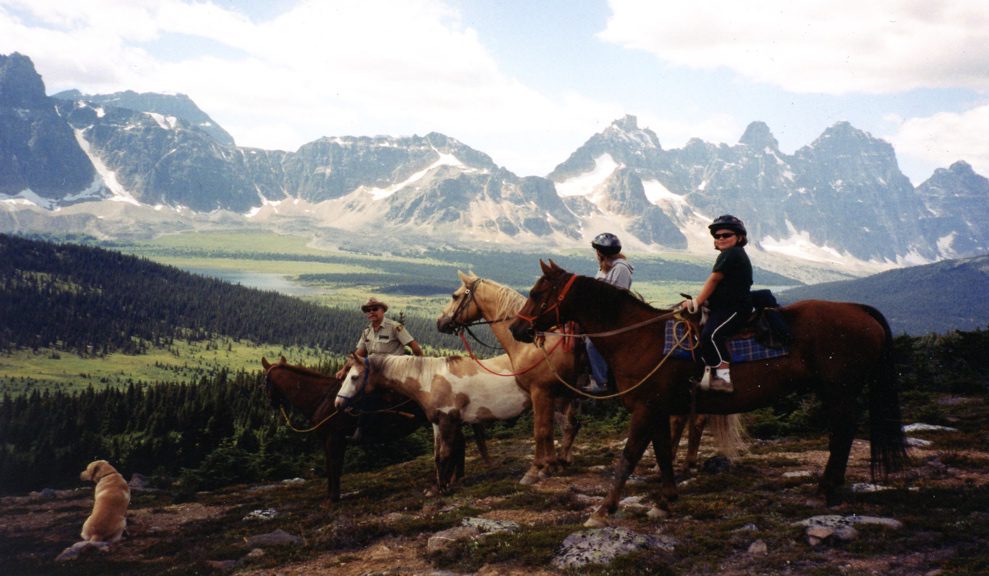
Mike and Becky (11) and Merewyn (6) in Majestic Basin 2002 and dog Maximus
Another time, we were coming out on horseback (one horse short so one walker) we were heading for Carrot Pass and Becky was out front walking and it was rain and snow mix, really awful cold and muddy trail. I was behind Becky a way on horseback leading a pack horse and Winifred and Merewyn were on horses behind me and because of my vantage point up higher, I could see further than Becky could and she’s walking with her head down because she’s soaking wet, had a hoodie on, and I could see coming towards us, a grizzly bear, just over a little rise from her on the trail. I told Becky to stop, turn around and walk back. And so she did and I dismounted. I had a big yellow lab (Maximus) with me at the time, too. It was a sow and one cub again, and she came up the trail to within maybe 30 yards of us or so and then she just stepped off the trail and paralleled us about 30 yards away, giving us a dirty look, every once in a while and stepping toward us to see if we would spook and of course the horses are all excited. And my dog, I managed to get him on a leash and he was just snarling and letting the bear know that she probably didn’t want to come too close to us. And then we all continued on our way. In the three years I was in there, we had tons of bear encounters like that, never anything too serious. That encounter was a little worrying mostly because I had my kids and who knew what would happen. That’s my kids’ favorite place in the world there in the Tonquin Valley.
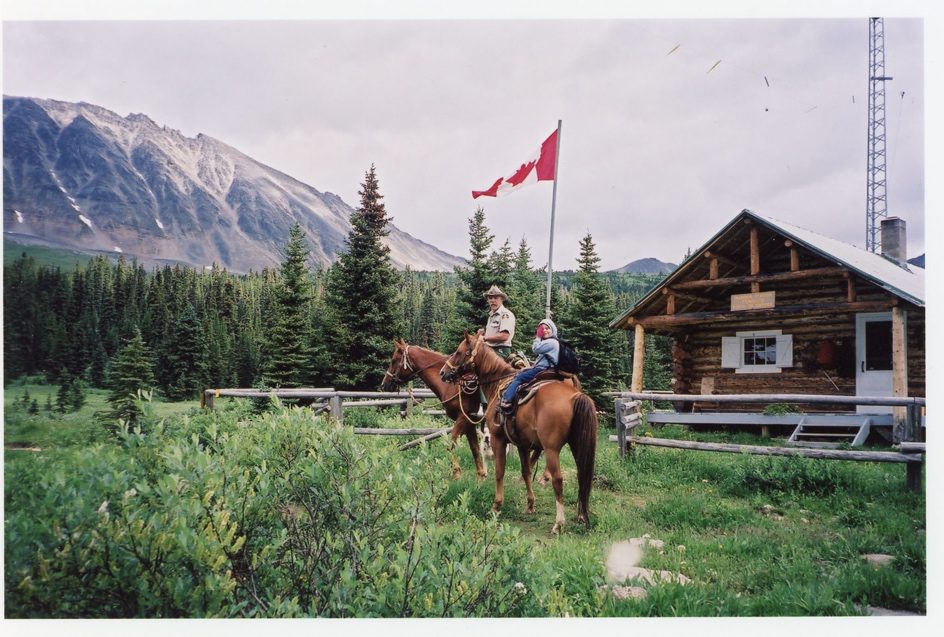
Mike Comeau and daughter Merewyn leaving warden cabin for campgrounds patrol 2002
38:11 I remember hunting avalanches with the 105 howitzer with Dave Norcross along the Icefields Parkway. That was a lot of fun. I only did that for one or two winters and then they went more to helicopter bombing. How it worked was we had the 105 howitzer on a trailer and we had all these sites marked out. It was before we used GPS, it was all UTMs (Universal Transverse Mercator) and at each site you would have coordinates for each target. So much elevation and what bearing and everything and we would just set up the 105 and and then just blast it. It was one shot per site and usually with the first shot, down would come the avalanches. Quite often they wouldn’t even hit the road, but sometimes they did. That was a lot of fun and my memory of Dave Norcross, he was the gunner.
The year I was in the back country in 1988, I mean I was still very much a rookie. And when Larry and I were getting ready to go, he took me on a real tortured trip introduction to the district and I think we put on 40 miles in the first couple of days and my butt was not ready for that, but we saw some great country. But at any rate, when we were getting ready to go, I was given a .308 Browning lever action saddle gun, and Larry told me to go see the backcountry supervisor for shells. So I went to see Gord Irwin in his office and he said, “Oh, no, I can’t give you those. Go see Perry Jacobson, he’s in charge of that kind of stuff.” So, went to see Perry in his office and he was all flustered and said, “Have you ever used a gun like this? I can’t give you any shells. Go back and see Gord again”. So, by this time, we’re getting ready to go… like we’re leaving. So I just said, Fuck it. I’ll go without shells, which I did. And so, it was about a month or two later and I met Sid Marty on the trail. He was coming out from the Dormer Pass and I was heading that way and I met him on the trail. And we got to talking and I told him about this. He said here and he gave me a magazine clip worth of shells. And other than that I would have been riding all season with no bullets in my gun. So then I had shells but as it turned out, I never needed to use any.
MH: How did the Warden Service change over the years? 4250
MC: Sadly, so many big changes. When we were generalists, we were trained in rescues, trained in immobilization of bears and wildlife management and trained in Law Enforcement, we could do it all. I think we performed the job really well and they started to specialize more and more and you get pigeonholed into one discipline or the other and gradually over time, you got so limited to what you can do. For the two years they took us out of Law Enforcement, when they were trying to come to a decision on the arming issue, that was the worst time for the warden service and for Parks. I mean, they hired extra RCMP, supposedly to do our Law Enforcement, but there was just so much going on that you weren’t allowed to action. All you could do was watch and record it and it was a really frustrating time. And then of course, with the arming of the warden service, of which I stayed in the warden service and became armed, then you were really ostracized from the rest of the warden service. There was a lot of bitterness, and I don’t know what it’s like now, but I did my best. I had a lot of friends who were either in Resource Conservation or in Public Safety and I maintained those relationships, but there was still a lot of bitterness with a lot of those guys losing their Stetsons, it was a big deal. That was the biggest change, even like I harken back to when I did a TV interview and two radio interviews, one national, with just the knowledge of being a warden and not all the political correctness of a communications expert, it was so much of a nicer place to work. But with all that said, even being just a Law Enforcement Warden and all you could do was Law Enforcement, it was still a better job than anything I can imagine. Still got to work in a postcard. It was tough for sure. And unfortunately, they kind of ruined the warden service in a lot of ways because it was a real respected, elite organization back in the day when we did it all. People were jealous of the Warden Service and we got a little too big for our britches and that was our downfall.
The warden service pioneered the long lining rescues and now it’s done all over the world. In the early days, in that first week in my career there, I was paired up with Peter Applejohn to sling under a long line and he was quite an excitable fellow, big guy. You clicked into this really heavy duty locking carabiner and at the time anyway, we both clipped into this carabiner and I clipped in and then he clipped in but the gate didn’t close before the helicopter lifted us off the ground and in this type of carabiner if it wasn’t screwed all the way down it kind of caught on the catch so that it couldn’t close all the way so he couldn’t screw it shut. Anyway, the helicopter lifted us off the ground before this thing was even closed. I mean, it wouldn’t be nearly as strong, but apart from that it was ok. Peter was having a bit of a fit, but anyway we managed to get it unscrewed so that the gate would close and then screwed up. But by this time, we were 400-500 feet off the ground. It was pretty exciting. You think of the scariest roller coaster ride you’ve ever been on and multiply that by ten. It was pretty wild. That morning, we slung from the airport in Banff to the top of Mount Louis.
MH: What about the Warden Service was important to you? 50:19
MC: For sure the protection and preservation of the ground we walk on, the flora, the fauna, the rocks, like just the protection. One of the things that really piqued me maybe not so serious, but littering and graffiti, those were two of my biggest pet peeves that you’d see all the time in your travels, but very rarely ever catch somebody in the act. You’d come along, and you either see the garbage or you see the graffiti but after the fact. I only ever saw somebody littering once. And it was at Saskatchewan crossing. It was a vehicle going the other way and as I passed them, they threw something out the passenger window. So, I spun around of course and sped up and caught up to them, pulled them over, and if it wasn’t a kid from Burns Lake. So, I made him go back and pick up all the litter along the highway from the bridge up to the Crossing, and that’s been the only time. And then as far as graffiti goes, one day in Lake Louise, when Winifred was working in Golden, and when she got home, she said, “What’s the next best thing to catching someone doing one of the things you hate?” And I said, “I don’t know, what?” She said, “Well, it’s having your wife catch somebody.” On her way home, coming through Yoho and here’s a guy in his station wagon and a kid spray painting graffiti on rocks on the side of the road just west of Field. So, she got the license number and gave them a tongue lashing and got a description and wrote it down and went up the road a little ways, and there was a cop who had somebody pulled over. So, she stopped and she was telling the RCMP what she’d seen and then she said, “There they go right now!” as they drove by. So the RCMP went and pulled them over. They were charged, but they were from Ontario, and they never showed up for court. Justice was never served there.
53:32 You hear the term ‘silent partner’ all the time, the wife of the wardens. Mostly when it comes to backcountry living, and Winifred certainly filled that role in the Tonquin. Most of the time I was gone on my own, and there’d always be people showing up needing some minor first aid or directions mostly; or dogs with their mouths full of porcupine quills or something like that, and she really filled that role. Once when we lived in Lake Louise we went for a drive on a day off and I decided I was going to show my little daughter who wasn’t even a year old yet, some wildlife and we knew there was lots of wildlife up on Highway 93. So, we saw bears alongside the road and we got up to Rampart Creek and there was a big blood splat in the middle of the road so I pulled over to check it out. Winifred got out and there was a little parking area right there and she was walking around and stumbled across a headless bighorn ram. She was pretty handy to have along, that girl.
MH: Are there any legendary characters or stories associated with the Warden Service that you can share? Anyone who stands out in the Warden Service? 5526
MC: Sid Marty, you know that time loaning me some ammo for my gun. Sid was quite a character. I didn’t get as much time with him as I would like to because we were on opposing shifts, but occasionally we would meet up at Stoney Creek when he was on his way out or way in and I was going the opposite way. Duane Martin comes to mind, Gord Peyto, Tom Davidson, Peter Enderwick, Al MacDonald, Keith Everts, I really had a lot of respect for Keith, and Dale Loewen too and Larry Gilmar, my supervisor that first year in the back country and Johnny Nylund, I really liked Johnny. And then in Jasper, there was Jim Bertwistle and Murray Hindle, Gord Anderson, Barny.
Do you remember Al Mac? Did you know about his little episode there (in Banff) with the sheep head and his dog at Indianhead? That’s a story that’s probably been forgotten by a lot of people. Well, he was my supervising warden in my first year in the backcountry in Lake Louise and we used to stop in at the outfitters camps that were just right on the park boundary, on the east side of the boundary like right out of the boundary, like there was a river, a creek really flowing into the Clearwater that was the boundary and these guys were all right on the other side. Anyway, he rode into this one and they asked if he wanted to come in for a coffee. We were encouraged to try to be friendly with the outfitters, the hunters who were trying to be legal, a lot of them were bending the rules a bit. But at any rate, he went in for coffee and meanwhile, this outfitter had shot a ram and they had the head outside, and when they came out from having their coffee, Al’s dog had to chewed the cape pretty bad. It was pretty embarrassing, but we found a roadkill later, and delivered it to this outfitter so that he could use this roadkill cape on this Bighorn head and then we weren’t allowed to take dogs with us in the back country anymore. That was the end of that. Al’s dog went with him just about everywhere in the backcountry up until then.
This was the type of job where experiences just piled on top of one another. So many stories from so many different people that could fill a library. When you look back at some of these, if it had have gone a little bit sideways, you might not be here. Especially being in the backcountry with horses by yourself, miles away from anything. When you were between cabins, you had no communication with the outside world, nothing. And, I mean, you’d have wrecks with your horses and sometimes you used a power saw. And I mean, mixing things together that could really cause disaster. Even back in the day when we weren’t armed and we didn’t even have pepper spray. When I first started, they gave you a set of handcuffs and a great big flashlight and that was your self-defense. Although they did teach you a few moves that I’ve used quite a bit, some slick little judo moves that we learned but apart from that, we weren’t armed, we didn’t have pepper spray and we didn’t have a baton. Most of the time when you had trouble, it was someone with a long rap sheet. AL and I that year I was in charge of the Crossing, a campground attendant from Rampart Creek, showed up, right about dark, to say that there was a group of people camping in the shelter, right in the middle of the campground, and one guy had a gun. And I mean, there’s other people camping in the campground and like,” What’s he doing with a gun?” And Rampart Creek, even if the cops were available and they were coming full speed, it was going to be quite a while before they got there. So anyway, we found out from the campground attendant, exactly where they were located inside the shelter and where the guy with the rifle was sleeping. We knew if you came in the entrance that he was right around to the right. And so AL and I went up there, pulled up our vehicle with lights on high right up to the door, jumped out and Al with a 12-gauge shotgun. And I just whipped around the corner. I knew where the guy was sleeping, put my foot on his chest, so he wouldn’t be able to get up and grabbed the rifle while AL was covering me with a shotgun. That was pretty intense and the gun was loaded. He had one in the chamber so all he had to do was pull the trigger on that. And he said it was for bears. But I mean, if some other camper had entered the shelter in the dark, would he have distinguished that person from a bear? The guy wasn’t American, he was a indigenous fellow from east of the park.
MH: Is there anything about the Warden Service, as you knew it, that you would like future generations to know?
MC: Just what a great, incredible, unbelievable job it was when we did it. All the backcountry horse use and the rescues and wildlife and everything. It was a dream job, really. Winifred was always going to get me a personalized license plate that said “paid to play” on it, because that’s what it was and if I ever write a book and someday might just write down my memoirs, it’s gonna be called Paid to Play!
Everyone else, like the public, other parks staff, maybe with the exception of the administration, they all looked up to the warden service. They all looked to us for answers, sort of like how the RCMP used to be viewed. They were the ones that would know the answer, and would give the final reason for something.
MH: And kind of the last defense, as a few people have mentioned, against preserving the parks, right?
MC: Yeah, for sure. And like you know yourself, Jasper and Banff are just so vast, and there’s just not enough people out in the field. And that’s where I spent my whole career, was in the field. I got out of the office as soon as I could or I wouldn’t even go into the office and just head out into the field, right away in the morning or at the beginning of the shift. I probably spent over 90% of my time in the field, to protect, to police and to educate the public. That’s what you need is lots of people in the field that sadly, we don’t have that anymore. There’s six wardens in Jasper if they are all working and Banff is pretty much the same way. I think there might be eight or something in Banff but there’s just not enough people out in the field to keep it protected. And one thing that really sticks in my craw right now is all these indigenous groups being allowed to hunt in Jasper, inside the park. The “Secwepemc” from Kamloops were granted permission for X amount of sheep, X amount of deer, one moose and several elk this year. They ended up harvesting 3 elk, 2 bighorn sheep, and 1 deer. Then another native band from Prince George found out about that, and they decided that they wanted to get in on it too. I realized that the native people spent time in Jasper before we created the park and were kicked out and relocated outside the park, but that’s no way to run a national park. There’s got to be some other allowance that can be made for the indigenous people than to allow them to go in there and hunt these tame animals that are used to tourists walking right up to them. And at the very least, if they are allowed to hunt there, it shouldn’t be with high powered rifles and ATVs and snowmobiles. That’s really disappointing to me and thank goodness, I retired before that started to happen.
MH: What made the Warden Service such a unique organization?
MC: What I’ve said before, how we were looked up to, and considered the authority on everything parks. And wearing the uniform representing Canada in a good light to people from across the country and all around the world. I’ve met people from all walks of life. And even people that I ran into in a Law Enforcement encounter that I had to charge, even a lot of them were good people. Some of them were assholes, no doubt, but most of those were people that had too much to drink in the campground. They were the worst people you had to deal with. Most of the people were just so happy to be there and just so in awe of what we have. It was nice to represent Canada.
